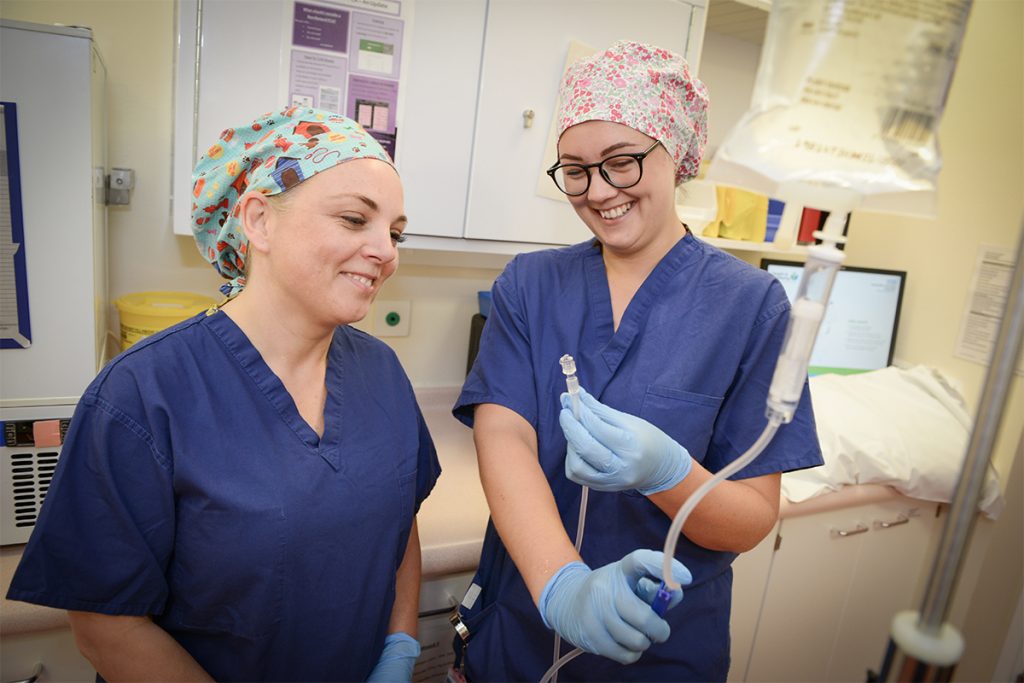 Lancashire Teaching Hospitals NHS Foundation Trust and Northumbria University have been approved by the Nursing and Midwifery Council (NMC) to deliver an 18-month Registered Nurse Degree Apprenticeship.
Lancashire Teaching Hospitals NHS Foundation Trust and Northumbria University have been approved by the Nursing and Midwifery Council (NMC) to deliver an 18-month Registered Nurse Degree Apprenticeship.
This accelerated course is available for existing Assistant Practitioner staff in NHS Trusts across the Lancashire and South Cumbria Integrated Care System (ICS).
The eligible staff will have relevant clinical experience and academic qualifications to enter a 3-year Registered Nurse Degree Apprenticeship programme at mid-point.
This exciting opportunity will enable Trusts to grow their own nursing workforce through a work- based model, adding additionality to the training of nurses through traditional existing pathways.
All Higher Education tuition fees will be paid for in full by each Trust’s apprenticeship levy and apprenticeship salary funding has been secured for an initial cohort of staff from the Lancashire and South Cumbria Local Workforce Action Board.
The course, planned to begin in September 2020, will see apprentices learn on-site in their hospital but receive training by Lancashire Teaching Hospitals’ teaching arm, The Health Academy.
Kerry Hemsworth, Deputy Director of Education at Lancashire Teaching Hospitals, said: “This dedicated apprenticeship programme is an innovative route that will help towards tackling the well-publicised nursing skills shortages the industry faces.
“The apprenticeship provides Trusts with a dedicated platform to develop their own staff versus the challenge of recruiting new nurses whilst giving staff the opportunity to upskills with no tuition fees and an apprenticeship salary.``
“Throughout the validation event, the Trusts and University were commended for their partnership development in this unique programme.”
The apprenticeship, developed by Northumbria University, uses web-based resources to teach theory elements allowing the apprentices to work at their own pace and revisit theory sessions over time.
The programme also allows for coaching methods to be used both in theory and in practice developing Enquiry-Based Learning (EBL) which will develop research and critical thinking skills.
Dr Debbie Porteous, Head of the Department of Nursing, Midwifery and Health at Northumbria University said this approval is recognition of the fantastic collaboration with the Trust, saying:
“The programme will be delivered by experienced, expert academics and clinicians so these apprentices will learn from the best, creating more excellent nurses for our NHS.
“This high-quality degree apprenticeship offers a new and different route for aspiring nurses to qualify in the profession, with the opportunity for trainees to earn as they learn, and we’re delighted to be collaborating with Lancashire Teaching Hospitals and partner Trusts in its delivery.
“The structure of this specialist nursing degree apprenticeship programme moves away from traditional separate blocks of theory and clinical practice to a more blended approach. All the students entering onto the programme will be enabled to learn, develop and qualify as registered nurses. This is an innovative programme to enable Lancashire and partner trusts to develop their workforce to graduate status.”
In addition to Lancashire Teaching Hospitals, the Trusts involved include; Blackpool Teaching Hospitals NHS Foundation Trust, East Lancashire Hospitals NHS Trust, Lancashire and South Cumbria NHS Foundation Trust and University Hospitals of Morecambe Bay NHS Foundation Trust.
Karen Partington, Co-Chair of the Lancashire and South Cumbria Local Workforce Action Board, added: “The Board are pleased to offer funding towards this exciting initiative which provides a clear development pathway for Assistant Practitioners operating within the Lancashire and South Cumbria ICS.
“The financial contribution will ensure that an apprenticeship salary can be offered to the initial cohort of learners to make the programme more accessible for those with aspirations of becoming a registered nurse.
“We look forward to seeing those enrolled onto the degree apprenticeship upskill in the workplace and wish them well on their journey and in their future careers.”